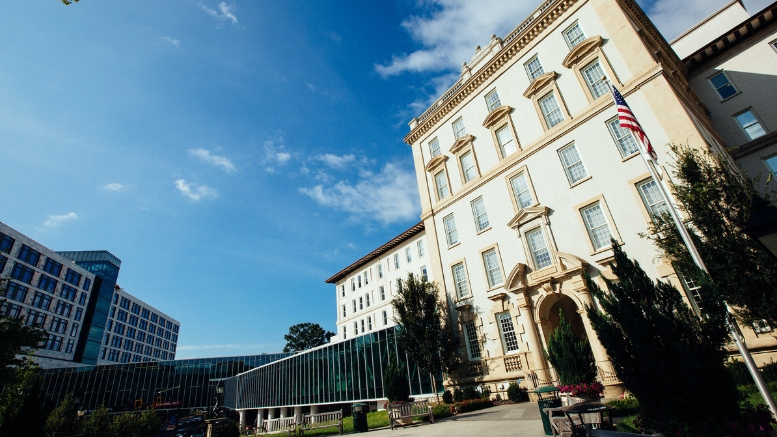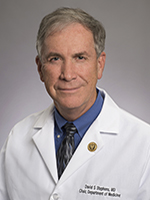*This story originally appeared in the Atlanta Business Chronicle. Click here for a link to the article.
By Crystal Edmonson – Atlanta Business Chronicle Broadcast Editor
Dr. David Stephens knew Covid-19 would become a problem months before mandatory shutdowns began.
He’s not a clairvoyant. He’s well-connected.
In his day job, Stephens is vice president for research at the Woodruff Health Sciences Center at Emory University. But he also leads a network of infectious disease scientists under the National Institutes of Health (NIH).
In January 2020, after a meeting with NIH officials, which included Dr. Anthony Fauci, Stephens said he told Emory leaders “a tsunami is coming.” At that time, there were no known cases of SARS-CoV-2 in the U.S.
Stephens was undeterred. He mobilized scientists across a national network of 10 vaccine treatment evaluation units (VTEUs), with Emory as the lead.
Just 80 days after that January meeting, Stephens said his team had trials for the Covid-19 Moderna vaccine underway.
Stephens, 72, has spent more than a year in high-gear. He has been working 12-hour days (longer if you include after-hours work emails and text messages) he said, taking on the worst pandemic since HIV/AIDS.
He is the 2021 Lifetime Achievement honoree for Atlanta Business Chronicle’s Health Care Heroes Awards.
“He’s been seen as a national expert for many years,” said Jonathan Lewin executive director of the Woodruff Health Sciences Center (WHSC). “Whether it’s epidemic meningitis, Ebola, COVID-19 or others, his input has helped people around the globe,” and boosted Emory’s reputation as a heath sciences research powerhouse.
Last year, Emory received a record $830 million in external research funding. In January 2021, U.S. News & World Report ranked Emory’s infectious diseases program fifth in the nation and ninth globally. The rankings and funding in many ways tie back to Stephens who has helped attract leading scientists to Emory.
“He has had a major role in recruitments,” said Lewin, including his own in 2015, when Lewin visited Emory as a candidate for executive vice president for health affairs. “Very quickly I saw that [Stephens] was quiet and understated, and an expert in almost everything we discussed,” Lewin recalled.
Stephens’ interest in science began decades before he came to Emory in 1982. As a high school student in East Tennessee-Chattanooga, Stephens said he enjoyed biology and knew he wanted to become a physician. He graduated from The Citadel and attended Bowman Gray School of Medicine at Wake Forest University. But it was nearly 3,200 miles from Wake Forest where his professional intentions “crystalized,” he said.
“Alaska was the place where I became interested in infectious disease,” Stephens said.
In 1975, he began a two-year stint as a general medical officer at U.S. Army Garrison Alaska Fort Greely, about 100 miles from Fairbanks, one of only two physicians in the area. During his time there, Stephens said they encountered everything from trichinosis to an influenza outbreak. The experience led him to pursue infectious disease research when he returned to Vanderbilt University to finish his clinical training in internal medicine. His early work was on preventing bacterial meningitis.
In the early 1980s, some thought that infectious diseases were on the decline. Because of the rise of effective antibiotics, he explained, “there were some pronouncements that the field was dead.”
Stephens spent one year on the faculty at Vanderbilt before joining Emory’s Department of Medicine and in 1992, he became Emory’s director of the Division of Infectious Diseases. During the next 21 years, he helped develop the Serious Communicable Diseases Unit (SCDU), Emory Center for AIDS Research and the NIH-funded Emory Vaccine Center (EVC).
“David was one of the main supporters of the concept of having an academic-based vaccine research center, which was a very novel concept at that time,” said Rafi Ahmed, director of the EVC, who met Stephens when Ahmed was recruited to Emory in 1995.
Ahmed described Stephens as a rarity because of his ability to grasp the clinical aspects of medical care and also understand the fundamentals of research.
Perhaps the reason he understands the varied aspects of healthcare and research is because of his many titles: Stephens is chair of the Department of Medicine, and a professor of microbiology and immunology in the School of Medicine. He is a professor of epidemiology at Emory’s Rollins School of Public Health, chairs the Research Advisory Council in the Woodruff Health Sciences Center (WHSC) and is a member of the executive committee on the WHSC leadership team.
“Gone are the days when you stay in your lab and you do your experiments and then write your papers,” said Kathryn Edwards, scientific director for the Vanderbilt Vaccine Research Program, who met Stephens in the 1970s when they were both starting their careers at Vanderbilt.
She said Stephens has figured out a collaborative “village” approach to how to implement policy, launch vaccine studies and get medicines to the community through a connected web of scientists, clinicians and investors.
In 2020, Emory marked its 11th consecutive year that outside research funding topped $500 million.
“You need the resources to do the work and make the impact,” Stephens said.
It is a lesson he learned and now teaches to younger researchers. He said he encourages them to be persistent when seeking funding, and tap more than one source.
“You can’t put all of your eggs in one grant application or funding source, you have to think across different sources both public and private,” he said, and if you do not get funding the first time, try again.
It is the act of discovery–whether for funding or a vaccine–that keeps Stephens motivated, and after four decades in the industry, he remains a sought-after resource.
“He’s one of those people that I go to for advice on important decisions,” Ahmed said. “And he’s played that role for many, many people at Emory, not just for me in the vaccine center.”
Lewin of the Woodruff Health Sciences Center agreed. “I go to him for any major research-related question,” he said of Stephens, “across many of our health science schools.”
Stephens splits his time between executive offices, classrooms and laboratories. During this past year, his work days have started around 7am and lasted well into the evening.
“The days are long, but the person in my family that probably works harder than I do at the moment is my wife,” Stephens said. Kathy Stephens, a research nurse manager, is involved in the clinical trials for the pediatric vaccine at the Emory Children’s Center.
Even in his downtime, Stephens enjoys doing research, but of a more personal nature. He spends time investigating his family’s genealogy.
At times, he has found evidence of infectious disease.
“A couple of my relatives died in 1918 probably presumably of the influenza pandemic,” he said. “There’s a lot of history in infectious diseases, the pandemics of the Middle Ages, cholera outbreaks, maybe that’s one of the reasons that I like history.”
History will have plenty to say about the current pandemic and how Covid-19 was quelled.
Stephens said the experiences of the past year reinforce the need to continue to invest in research and forge greater coordination between the scientific and the public health communities to get vaccines to the people who need them.



Be the first to comment on "Emory’s Dr. David Stephens receives 2021 Health Care Heroes Lifetime Achievement Award"